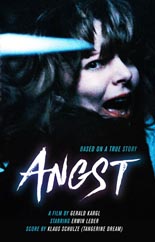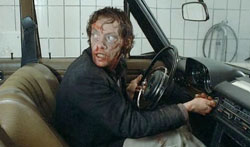
 Angst has bounce. That’s because for some of the running time, the camera is attached to the German-language film’s lead character. A certifiable psychopath, he’s not the kind of person to whom you would wish to be so close.
Angst has bounce. That’s because for some of the running time, the camera is attached to the German-language film’s lead character. A certifiable psychopath, he’s not the kind of person to whom you would wish to be so close.
Played by Erwin Leder (Das Boot), who narrates almost the entire picture, the normal-looking man is, in actuality, an evil brute whose uncontrollable urge to torture humans bubbles over mere minutes after being released from a 10-year prison stint for murder; he had chosen a random house and, just for the hell of it, pulled a gun and point-blank executed the elderly woman who made the unfortunate mistake of answering the door.
 Now freed from bars once more, he’s got that itch that really needs scratching, and finds it in a fairly secluded home occupied by a small family that includes a wheelchair-bound young man who drools uncontrollably. Thus begins the “meat” of the movie: a triple murder played out in excruciating, graphic detail and violence that escalates to vile.
Now freed from bars once more, he’s got that itch that really needs scratching, and finds it in a fairly secluded home occupied by a small family that includes a wheelchair-bound young man who drools uncontrollably. Thus begins the “meat” of the movie: a triple murder played out in excruciating, graphic detail and violence that escalates to vile.
It’s revolting enough early in the film to see an extreme close-up of the psychopath tear into a sausage like an animal; it’s near-unbearable — those with a weak constitution should nix the “near-” — to witness what is essentially a how-to piece. Director/co-writer Gerald Kargl never made another picture before or since, so at least his lone foray into features is unforgettable — just not in the way the populace likes. Based on real-life events, it’s tough and uncompromising and hardly “entertainment.” Aided and abetted by Tangerine Dream co-founder Klaus Schulze’s score and with astute, dark-humored details such as a dog chewing on the dentures knocked out of an old woman’s mouth, Angst has artistry that can be acknowledged while simultaneously loathing the work as a whole. —Rod Lott
